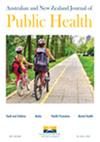Emergency contraception access in Fijian community pharmacies: A descriptive study
IF 2.4
3区 医学
Q2 PUBLIC, ENVIRONMENTAL & OCCUPATIONAL HEALTH
Australian and New Zealand Journal of Public Health
Pub Date : 2024-09-26
DOI:10.1016/j.anzjph.2024.100191
引用次数: 0
Abstract
Objective
To assess pharmacists’ knowledge regarding emergency contraceptive pills (ECPs), their attitudes towards women obtaining ECPs, and ECP counselling and dispensing practices.
Methods
An online cross-sectional survey using Qualtrics was distributed via pharmacy emails and networks to recruit registered pharmacists working in community-based pharmacies.
Results
There were 22 valid respondents, predominantly female pharmacists (68%), with an average of 7.5 years of registration. All pharmacists knew the correct time frame after unprotected sex for ECPs to be effective, and 73% knew how ECPs worked, but only 50% knew that there were no contraindications. Most pharmacists (86%) knew that ECPs should be available to all women and girls, but only 59% thought that a married woman should not have to get permission from her husband to buy ECPs. Information or education for clients on the correct use of ECPs was mainly provided by pharmacists (59%), mostly through verbal communication (96%). Only 5% of pharmacists had used the emergency contraception methods wheels.
Conclusions
There were gaps in pharmacists’ knowledge regarding ECPs. Biases, judgemental attitudes, and suboptimal practices existed.
Implications for public health
Targeted education and training for pharmacists is needed to improve access to ECPs in Fiji.
斐济社区药房提供的紧急避孕药具:描述性研究
目的 评估药剂师对紧急避孕药(ECPs)的了解程度、她们对女性获得 ECPs 的态度以及 ECP 咨询和配药实践。方法 使用 Qualtrics 进行在线横断面调查,通过药房电子邮件和网络招募在社区药房工作的注册药剂师。所有药剂师都知道 ECPs 在无保护性行为后的正确有效时间,73% 的药剂师知道 ECPs 的作用,但只有 50% 的药剂师知道 ECPs 没有禁忌症。大多数药剂师(86%)知道应向所有妇女和女孩提供 ECPs,但只有 59% 的药剂师认为已婚妇女购买 ECPs 无需征得丈夫同意。药剂师(59%)主要通过口头交流(96%)向客户提供正确使用 ECPs 的信息或教育。只有 5% 的药剂师使用过紧急避孕方法轮。对公共卫生的启示斐济需要对药剂师进行有针对性的教育和培训,以改善紧急避孕药具的使用。
本文章由计算机程序翻译,如有差异,请以英文原文为准。
求助全文
约1分钟内获得全文
求助全文
来源期刊

Australian and New Zealand Journal of Public Health
医学-公共卫生、环境卫生与职业卫生
CiteScore
4.20
自引率
5.70%
发文量
121
审稿时长
6-12 weeks
期刊介绍:
The Australian and New Zealand Journal of Public Health (ANZJPH) is concerned with public health issues. The research reported includes formal epidemiological inquiries into the correlates and causes of diseases and health-related behaviour, analyses of public policy affecting health and disease, and detailed studies of the cultures and social structures within which health and illness exist. The Journal is multidisciplinary and aims to publish methodologically sound research from any of the academic disciplines that constitute public health.
 求助内容:
求助内容: 应助结果提醒方式:
应助结果提醒方式:


